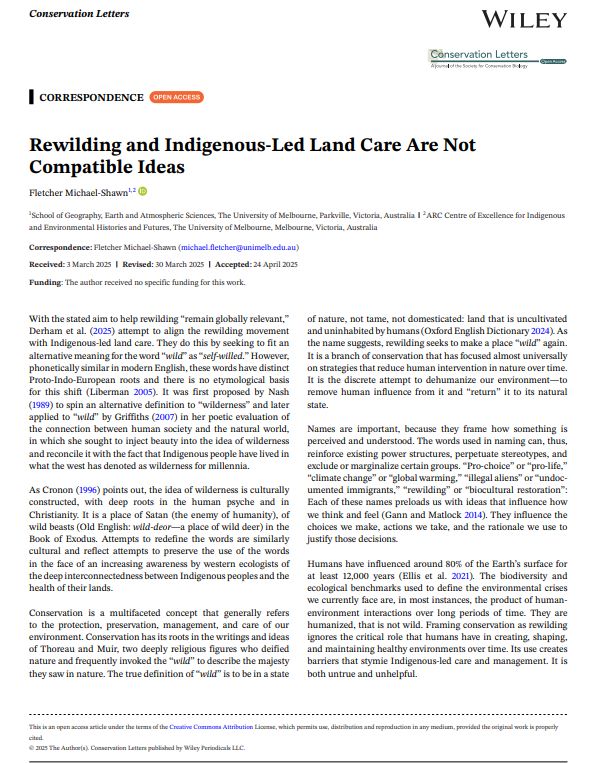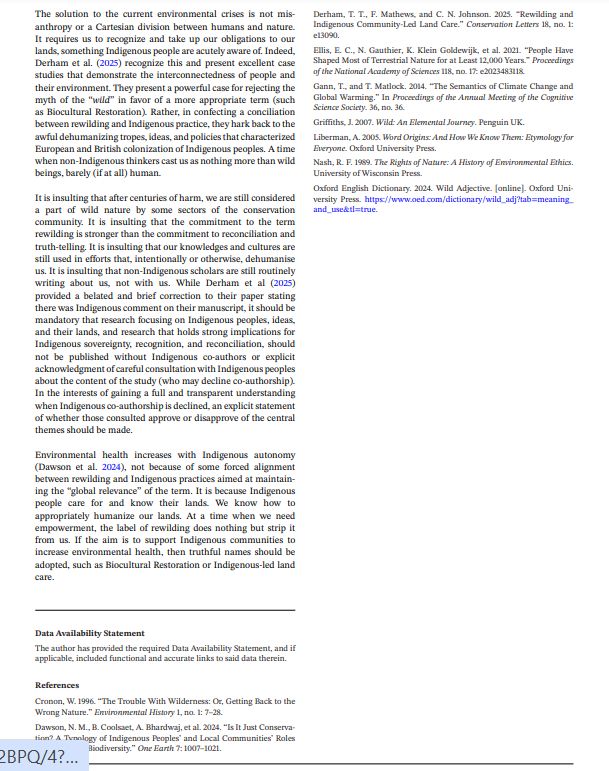
https://conbio.onlinelibrary.wiley.com/journal/1755263x
via @cmmonwealth.bsky.social
#climatecrisis

Spoiler alert: compounding increases risk ☹️

Spoiler alert: compounding increases risk ☹️


Read more here👇
conbio.onlinelibrary.wiley.com/doi/10.1111/...

Read more here👇
conbio.onlinelibrary.wiley.com/doi/10.1111/...

"Our results were clear: across both countries, our experts judged that #political will and #law enforcement were by far the most important factors for protecting #forests...
theconversation.com/protecting-b...

"Our results were clear: across both countries, our experts judged that #political will and #law enforcement were by far the most important factors for protecting #forests...
theconversation.com/protecting-b...



conbio.onlinelibrary.wiley.com/doi/10.1111/...

conbio.onlinelibrary.wiley.com/doi/10.1111/...

@consletters.bsky.social
👉 Full article here: conbio.onlinelibrary.wiley.com/doi/10.1111/...
@consletters.bsky.social
👉 Full article here: conbio.onlinelibrary.wiley.com/doi/10.1111/...
Thought-provoking piece by Michael-Shawn Fletcher in @consletters.bsky.social


Thought-provoking piece by Michael-Shawn Fletcher in @consletters.bsky.social


@consletters.bsky.social @ebdonana.bsky.social @azti.bsky.social
See thread below
conbio.onlinelibrary.wiley.com/doi/full/10....

@consletters.bsky.social @ebdonana.bsky.social @azti.bsky.social
See thread below
conbio.onlinelibrary.wiley.com/doi/full/10....
Our perspective explores the legal uncertainties in wildlife trade, and how to resolve them 🦜
A product of @iccs.bsky.social Interdisciplinary Conservation Network, this works draws insights from a brilliant group of ECRs and mentors

Our perspective explores the legal uncertainties in wildlife trade, and how to resolve them 🦜
A product of @iccs.bsky.social Interdisciplinary Conservation Network, this works draws insights from a brilliant group of ECRs and mentors
Protect the Integrity of CITES: Lessons From Japan's IWC Withdrawal
by Cheung&al doi.org/10.1111/conl...
Can elephans learn from whales? We think conservation policy can: effective wildlife trade governance requires international cooperation, not polarization

Protect the Integrity of CITES: Lessons From Japan's IWC Withdrawal
by Cheung&al doi.org/10.1111/conl...
Can elephans learn from whales? We think conservation policy can: effective wildlife trade governance requires international cooperation, not polarization
#citizenscience #conservationscience #conservation #ICYMI
conbio.onlinelibrary.wiley.com/doi/full/10....

#citizenscience #conservationscience #conservation #ICYMI
conbio.onlinelibrary.wiley.com/doi/full/10....
"People may believe AI tools will be the answer to all their problems, but it's important to understand that they're only as good as the data they've been trained on."
Paper from @consletters.bsky.social
🌍🍄🐛🦑

"People may believe AI tools will be the answer to all their problems, but it's important to understand that they're only as good as the data they've been trained on."
Paper from @consletters.bsky.social
🌍🍄🐛🦑
Now out & open access in @consletters.bsky.social
#fishes #oceanoptimism #conservation
Collaborative effort with @fisheriesprof.bsky.social, @valeriosbra.bsky.social, @rarlinghausfish.bsky.social et al.
conbio.onlinelibrary.wiley.com/doi/full/10....

Now out & open access in @consletters.bsky.social
#fishes #oceanoptimism #conservation
Collaborative effort with @fisheriesprof.bsky.social, @valeriosbra.bsky.social, @rarlinghausfish.bsky.social et al.
conbio.onlinelibrary.wiley.com/doi/full/10....
#bigcats #wildlifeconflict
news.mongabay.com/2025/03/chai...

#bigcats #wildlifeconflict
news.mongabay.com/2025/03/chai...

